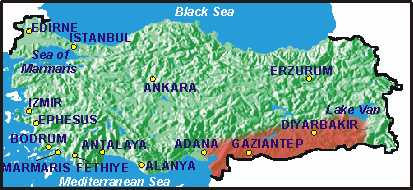
Turkey
| Turkey - Health Advice |
Travel-Images.com
|
 |
Health advice
for
Turkey |
Immunisations
Confirm those recommended
for use in your country of residence are up to date,
especially those for children and adult boosters of tetanus.
Courses or boosters usually advised:
hepatitis A.
Vaccines sometimes advised: diphtheria;
tuberculosis; hepatitis B; poliomyelitis; rabies; typhoid.
No vaccine certificate required.
NOTES ON THE DISEASES MENTIONED ABOVE
Tetanus is contracted through dirty
cuts and scratches and poliomyelitis spread through contaminated food and
water. They are serious infections of the nervous system.
 Typhoid
and hepatitis A are spread through contaminated food and water. Typhoid
causes septicaemia and hepatitis A causes liver inflammation and jaundice.
In risk areas you should be immunised if good hygiene is impossible.
Typhoid
and hepatitis A are spread through contaminated food and water. Typhoid
causes septicaemia and hepatitis A causes liver inflammation and jaundice.
In risk areas you should be immunised if good hygiene is impossible.
Tuberculosis is most commonly transmitted via droplet infection. Those going to countries where it is common, especially those mixing closely with the local population and those at occupational risk, e.g. health care workers, should ensure that they have previously been immunised. Check with your doctor or nurse.
Diphtheria is also spread by droplet infection through close personal contact. Vaccination is advised if close contact with locals in risk areas is likely.
Hepatitis B is spread through infected blood, contaminated needles and sexual intercourse, It affects the liver, causes jaundice and occasionally liver failure. Those visiting high risk areas for long periods or at social or occupational risk should be immunised.
Rabies is spread through bites or licks on broken skin from an infected animal. It is always fatal. Vaccination is advised for those going to risk areas that will be remote from a reliable source of vaccine. Even when pre-exposure vaccines have been received urgent medical advice should be sought after any animal bite.
Malaria
Malaria is a serious and sometimes
fatal disease transmitted by mosquitoes. You cannot be vaccinated against
malaria.
 MALARIA
PRECAUTIONS
MALARIA
PRECAUTIONS
Malaria precautions
are essential only in the far eastern provinces of Cukurova, Amikova and
the low lying areas around Side and Adana in coastal Anatolia, from May
to October. (There is minimal or no malarial risk in the main tourist
areas in the west and southwest of the country). Avoid mosquito bites by
covering up with clothing such as long sleeves and long trousers especially
after sunset, using insect repellents on exposed skin and, when necessary,
sleeping under a mosquito net.
Check with your doctor or nurse about suitable antimalarial tablets. The Turkish word for Malaria is "Sitma" (no dot on the "i").
(Chloroquine or proguanil is usually recommended for those visiting risk areas during the transmission season).
Prompt investigation of fever is essential.
source: Scottish NHS
 |
 |
| see also: images, health, UNESCO sites, flags, airports, airlines, time zones, currencies, dialling codes, calendar conversion |
| Turkey - Health Advice |
www.travel-images.com
|